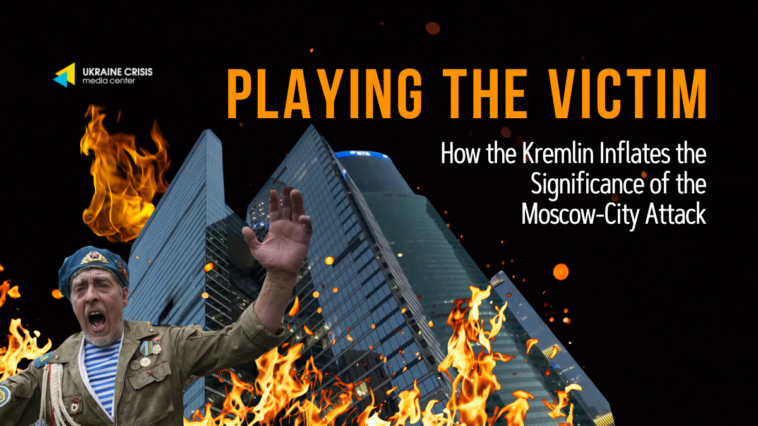One of the central narratives of the information dimension of the Russian Federation’s war against Ukraine is the image of Ukraine as a “terrorist country,” a “terrorist regime,” and the actions of the Armed Forces of Ukraine to protect the territorial integrity of Ukraine as “terrorism.” The drone attacks on the Moscow-City office center in Moscow on July 30 and August 1 became the reason for another use of this narrative.
The image of the victim
The Ministry of Defense of the Russian Federation accused Ukraine of attacks on the business center “Moscow-City” in the capital of the Russian Federation. Russian propaganda used the narrative of the “terrorist Kyiv regime” to equate itself with the victims of the terrorist attack on September 11, 2001, when, as a result of the attack of the Islamist organization “Al-Qaeda”, the World Trade Center in the USA was destroyed.
Background : The 9/11 attacks were a series of coordinated terrorist attacks carried out using four hijacked airliners. Two of the planes were directed by terrorists into the twin towers of the World Trade Center, which led to its complete destruction. The attacks killed 2,996 people and injured more than 6,000.
“Recently, the Kyiv regime has switched to terrorist activities in the style of the banned ISIL and Al-Qaeda… I have a question for the Americans, not even for the State Department and the White House, but for ordinary Americans: have you forgotten the terrorist attacks in Manhattan that you call 9/11?”
Director of the Information and Press Department of the Ministry of Foreign Affairs of the Russian Federation, Maria Zakharova.
This is how the spokeswoman of the Russian Foreign Ministry tries to communicate the attack on Moscow, presenting Russia, the aggressor state that started the war of aggression in Ukraine, as the victim.
The appeal to ordinary Americans is also no accident and works to strengthen the position, as 93% of Americans aged 30 and older remember the attack of 9/11 as a powerful, if not life-changing, memory.
Propagandist Margarita Simonyan, like Zakharova, points to the “terrorist” nature of the attacks and says that Ukraine is…
“Trying to stage a bloody show in the center of Moscow a la 9/11.”
Propagandist Margarita Simonyan
However, it is interesting to note, the press secretary of the President of the Russian Federation…
“The Kremlin does not see any commonalities between the attempted drone attacks on the Moscow City towers and the terrorist attack in New York on September 11, 2001.”
Dmitry Peskov, Press secretary of the President of the Russian Federation
Propaganda messages have a coordinated nature. Despite different interpretations, the main line of the propaganda campaign is aimed at discrediting Ukraine and justifying Russia’s aggressive actions. Thus, another wave of accusations of “terrorism” by Kyiv is unfolding. Against the background of Russia’s constant shelling of Ukrainian cities, this fact once again proves the criminal nature of the state information policy of the Russian Federation, which plays a leading role in mobilizing public sentiment and promoting the so-called “special military operation.”
Double standards
Due to the “terrorist” stigma, pressure is exerted on Ukraine’s international partners. In particular, the aforementioned Maria Zakharova stated that Germany sponsors terrorism by supplying the “Kyiv regime” with weapons. Thus, propaganda tries to undermine international support for Ukraine as a state fighting for its freedom.
Another representative of the Russian Federation, a member of the State Duma of the Russian Federation, Alexander Borodai, called Ukraine a “terrorist organization of the United States.”
“In order to destroy the source of terrorism, it is necessary to eliminate President Volodymyr Zelenskyi.”
Alexander Borodai, Member of the State Duma of the Russian Federation
At the same time, the official position of the Ministry of Internal Affairs of the Russian Federation is not to recognize Ukraine as a terrorist state, because the concept of “state terrorism” is a “pseudo-legal doctrine of the West”, which the Russian Federation rejects.
There is a reason why the Kremlin applies a double standard on this issue.
As of August 1, 2023, a number of states and international organizations, including the European Parliament , recognized the Russian Federation as a state sponsor of terrorism. Therefore, at the level of official positions, the Kremlin cannot operate with the concept of “state sponsor of terrorism,” because this is how it acknowledges the accusation against itself.
Label: “The Ministry of Internal Affairs announced that recognizing Ukraine as a terrorist state would be a mistake.”
Regularly using the label “terrorism” in relation to Ukraine, propaganda tries to shift the focus of the international community from the fact that more and more countries and international organizations recognize the Russian Federation as a state sponsor of terrorism.
“State Sponsor of Terrorism” is a special designation utilized by the United States to identify certain countries that support international acts of terrorism. This status carries legal, economic, and diplomatic consequences. However, due to Russia’s full-scale war against Ukraine, other nations have shown interest in granting Russia this status through their parliaments. Since the European Union currently lacks the official authority to designate states as sponsors of terrorism, the European Parliament has urged the EU and its member states to establish the appropriate legal framework and contemplate adding Russia to such a list.
According to the European Parliament, the Council of Europe’s Parliamentary Assembly and the four national parliaments of four EU Member States have adopted non-binding resolutions declaring Russia a state sponsor of terrorism as of November 2022. The Lithuanian Parliament adopted its resolution on May 11, 2022; the Latvian Parliament followed suit on August 11, 2022; the Estonian Parliament adopted its resolution on October 18, 2022; and the Polish Senate on October 26, 2022. Slovakia joined the trend on February, 16, 2023.



